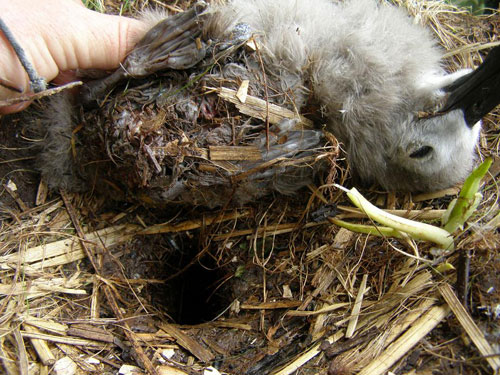Steffen Oppel of the Royal Society for the Protection of Birds (RSPB) and colleagues, writing in the journal Conservation Biology, have looked at how the presence of human populations on islands can complicate attempts to eradicate invasive mammals, such as rodents and feral cats.
Although the majority of islands where ACAP-listed species breed are not permanently inhabited by humans, there are some notable exceptions. These include the main island of Tristan da Cunha (Atlantic Yellow-nosed Thalassarche chlororhynchos and Sooty Phoebetria fusca Albatrosses), some islands in the Falkland Islands (Islas Malvinas)* (Black-browed Albatross T. melanophris and Southern Giant Petrel Macronectes giganteus) and some of the "high islands" in the USA's Hawaiian group (Laysan Albatross Phoebastria immutabilis). All of these islands support at least invasive mammal, so the advice given in this publication should aid the design and implementation of eradication efforts, as well as the design of biosecurity protocols to reduce the risk of reintroductions.
The paper's abstract follows:
"Non-native invasive mammal species have caused major ecological change on many islands. To conserve native species diversity, invasive mammals have been eradicated from several islands not inhabited by humans. We reviewed the challenges associated with campaigns to eradicate invasive mammals from islands inhabited by humans and domestic animals. On these islands, detailed analyses of the social, cultural, and economic costs and benefits of eradication are required to increase the probability of local communities supporting the eradication campaign. The ecological benefits of eradication (e.g., improvement of endemic species' probability of survival) are difficult to trade-off against social and economic costs due to the lack of a common currency. Local communities may oppose an eradication campaign because of perceived health hazards, inconvenience, financial burdens, religious beliefs, or other cultural reasons. Besides these social challenges, the presence of humans and domestic animals also complicates eradication and biosecurity procedures (measures taken to reduce the probability of unwanted organisms colonizing an island to near zero). For example, houses, garbage-disposal areas, and livestock-feeding areas can provide refuges for certain mammals and therefore can decrease the probability of a successful eradication. Transport of humans and goods to an island increases the probability of inadvertent reintroduction of invasive mammals, and the establishment of permanent quarantine measures is required to minimize the probability of unwanted recolonization after eradication. We recommend a close collaboration between island communities, managers, and social scientists from the inception of an eradication campaign to increase the probability of achieving and maintaining an island permanently free of invasive mammals."
Reference:
Oppel, S., Beaven, B.M., Bolton, M., Vickery, J. & Bodey, T.W. 2011. Eradication of invasive mammals on islands inhabited by humans and domestic animals. Conservation Biology 25: 232-240.
Click here to access ACAP's eradication guidelines.
With thanks to Steffen Oppel for information.

John Cooper, ACAP Information Officer, 08 July 2011
*A dispute exists between the Governments of Argentina and the United Kingdom of Great Britain and Northern Ireland concerning sovereignty over the Falkland Islands (Islas Malvinas), South Georgia and the South Sandwich Islands (Islas Georgias del Sur y Islas Sandwich del Sur) and the surrounding maritime areas.

 English
English  Français
Français  Español
Español